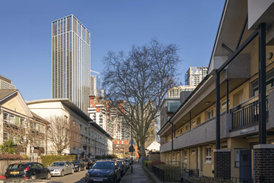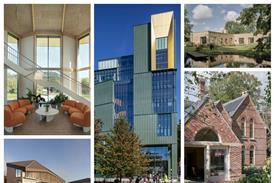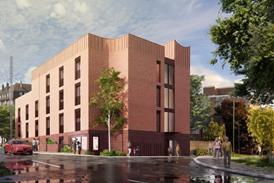New administrative groupings are needed in government and local authorities to ensure joined up strategy across the health, social care, transport and planning agendas, Flora Samuel writes

The pandemic offers a real opportunity to build back better, both for future resilience and to address the climate change emergency – which has not been forgotten.
Changes to the planning system to accelerate economic growth have been shown not to work. Planning is too important to be done hastily, so I hope the great efforts that everyone has been making to respond to the recent Planning for the Future consultation have some traction.
Given the likelihood of a recession, great care needs to be taken with the use of scant resources. Planning policy and local authorities that focus on wellbeing and placemaking are more resilient to events such as the pandemic as they already had systems in place that in some way addressed many of the problems caused by covid-19.

Of course resilience starts with the home, its design and its context. Flexible space is needed in all homes as they increasingly become places of work.
All homes should have access to balconies, daylight and broadband. Digital inclusion has become a major issue as services are increasingly delivered online.
Parks, green space and walking routes have been well used during the pandemic; not only as a place for exercise and meetings with friends, but also as a place of escape from overcrowded and uncomfortable accommodation during the summer months.
They have been particularly important to those people who lack garden space or balconies or even windows in their homes. A statutory requirement for adequate levels of good quality green and amenity space for all new planning proposals is needed across the UK using a measure such as the Fields In Trust barometer.
The pandemic also offers an opportunity to rethink density and the way people move around their neighbourhoods. Travel and health need to be seen as an integrated agenda. Public investment is needed in integrated transport systems to ensure access for all.
The use of local services and materials needs to be encouraged at every level, especially public procurement and in the choreography of our high streets. This includes local construction companies who need support and investment (including the development of safer off-site construction) as they are best positioned to deliver new homes to their communities.
Community spaces need to be protected and enhanced. They play a major role in volunteering efforts and in reducing social isolation and could be expanded to include a host of other purposes such as health education and the support of small businesses.
Redundant buildings, such as empty offices and workspaces, shops and student accommodation, need to be repurposed in a responsible, holistic way that offers spillover benefits to the community. Urban farming is one example (food production being the biggest contributor to climate change).
The way that the government and local authorities deliver services needs to be reviewed in light of what has been learnt from the pandemic. Advanced budgetary planning is needed for emergencies enabling national governments and local authorities to act responsibly and efficiently without concerns about who will pay. After years of austerity there is not enough fat in the system to cover such emergencies.
The centralisation of services needs to be reconsidered, with the government taking the lead on a better dispersal of jobs across the UK, including to rural areas, facilitated by digital communication.
Dispersed small-scale solutions may not lend themselves to current ways of auditing and promoting government achievements in this area (for example numbers of hospitals built). So other forms of auditing that measure impact more holistically are needed to capture the value of small interventions.
These observations are based on interviews I have been doing over the past six months with policy makers, local authorities, housing providers and others at the front line of service delivery. You can read more about them here.
Perhaps the most important lesson coming from the interviews is that new administrative groupings are needed in government and local authorities to ensure joined up strategy across the health, social care, transport and planning agendas. Breaking Barriers Innovations are facing this head on.
















No comments yet